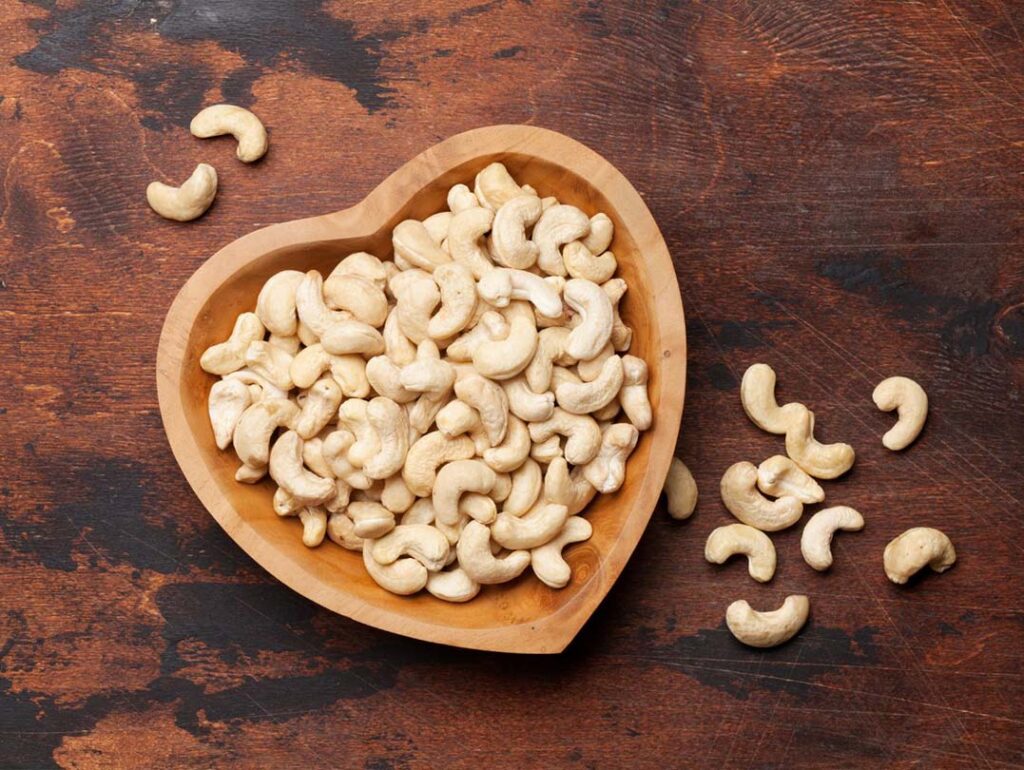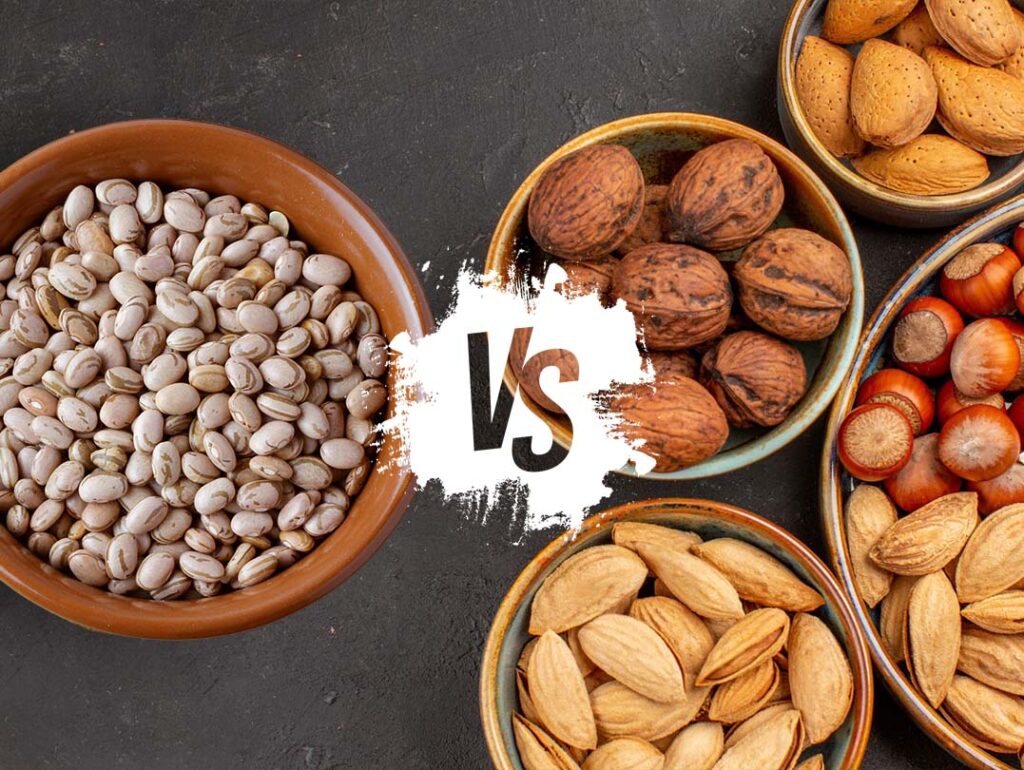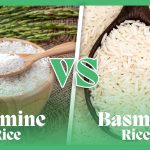In the world of nutrition, each food item plays a huge role in bringing its unique blend of essential nutrients necessary for well-being. Among those countless items, there is one food often found in the mix of nuts or in a salad bowl, which is a treasure chest of nutrients. Cashews–nature’s gift to mankind, are nutritional powerhouses packed in their shells with their own health story to narrate.
In this article, we will unravel the nutritional mysteries hidden among these tiny bite-sized snacks necessary for a balanced life!
What are cashews?
Native to Central and South America, these crunchy nuts are the seeds of cashew apples. Also grown in Vietnam, India, and Nigeria, the cashew tree produces the fruit known as the apple and a seed hanging beneath the fruit.
These kidney-shaped seeds are often sold as raw, but the actual raw cashews are unsafe to consume due to a toxic substance urushiol commonly found in poison ivy. Urushiol causes skin blisters upon its contact with skin and is removed by cooking in the processing, the resulting cashews are sold as raw.
Cashews have been highly associated with their role in weight loss, diabetes, and heart diseases. We’ll explain all the details ahead.

Nutrient composition:
According to USDA, an ounce or 28.35 grams of cashews serves 157 kilocalories. They are a good source of protein providing 5.16 grams, while their carbohydrate content is 8.56 grams. Cashews, like other nuts, are high in healthy fats (12.4 g), most of which come from monounsaturated fatty acids (6.75 g).
Apart from the macros, cashews are rich in minerals and vitamins, especially magnesium, iron, phosphorus, zinc, copper, and niacin.
| Nutrients | Amount (1 oz= 28.35 g) |
|---|---|
| Energy | 157 kcal |
| Protein | 5.16 g |
| Total fats | 12.4 g |
| Saturated fats | 2.21 g |
| Monounsaturated fatty acids | 6.75 g |
| Polyunsaturated fatty acids | 2.21 g |
| Carbohydrates | 8.56 g |
| Dietary fiber | 0.936 g |
| Total sugars | 1.68 g |
| Minerals | |
| Calcium | 10.5 mg |
| Iron | 1.89 mg |
| Magnesium | 82.8 mg |
| Phosphorus | 168 mg |
| Sodium | 3.4 mg |
| Zinc | 1.64 mg |
| Copper | 0.625 mg |
| Manganese | 0.471 mg |
| Selenium | 5.64 μg |
| Vitamins | |
| Vitamin C | 0.142 mg |
| Thiamine | 0.12 mg |
| Riboflavin | 0.016 mg |
| Niacin | 0.301 mg |
| Pantothenic acid | 0.245 mg |
| Vitamin B6 | 0.118 mg |
| Folate | 7.09 μg |
| Vitamin E | 0.255 mg |
| Vitamin K | 9.67 μg |
Role in human nutrition:
Cashews are rich in proteins, healthy fats, and polyphenols and provide several health benefits:
Reduce cholesterol:
The abundance of mono and polyunsaturated fatty acids in cashews reduces total and LDL cholesterol. However, some studies suggest that the presence of healthy fats along with vegetable proteins, fibers, vitamins, and phytochemicals may help reduce the risk of elevated cholesterol levels.
Cashews have had a bad reputation for containing a considerable amount of saturated fats, but research suggests that the fats in cashews are in the form of stearic acid, that have little to no impact on cholesterol levels.
Improve heart health:
The presence of healthy fats with magnesium and some fiber in cashews reduces cholesterol levels and lowers the risk of stroke and cardiovascular complications including ischemic heart disease.
Oleic acid, a monounsaturated fatty acid found in cashews, is particularly beneficial for heart health (1).
Prevent diabetes:
Patients with diabetes type-2 may highly benefit from consuming cashews regularly. Their low carbohydrate content does not cause a rapid surge in glucose, hence keeping blood glucose levels in control.
Studies confirm these findings where one study concluded that substituting 10% of total energy intake with cashews reduces diabetes (2).
Manage weight:
Nuts were first considered unsuitable for weight loss due to their high calorie and fat content. However, researchers found out that consuming nuts has the opposite effect while these concepts are baseless. The healthy protein, fat, and fiber in cashews may keep one satiated for a long time and prevent overeating.
Some studies suggested that those who consume cashews twice a week are expected to lose and maintain weight more than those who seldom consume them (1).
Prevent cancer:
Certain phytochemicals found in cashews help the body prevent cancer. Flavonols, a type of phytochemicals, fight the tumor cells to prevent their division. The flavonols contain copper that prevents the formation of cancer cells in the body, especially the colon.
Furthermore, copper helps in other physiological processes like neutralizing free radicals, skin pigment protection, and bone development (1).
Bone health:
Along with copper, cashews are rich sources of calcium and magnesium, responsible for keeping bones healthy. We all are aware of the beneficial effects of calcium in bones, but little do we know that 60% of our body’s magnesium is located in bones.
Prevent gallstone formation:
Evidence, although limited, shows that consumption of cashews reduces the likelihood of gallstone formation both in men and women.
Data regarding women has shown that eating 1 ounce of nuts (2 tablespoons) each week lowers the risk of developing gallstones by up to 25% (1).
Improve vision:
Two powerful antioxidants- lutein and Zeaxanthin found in cashews help in healthy vision. These antioxidants improve vision by protecting our eyes from light damage and age-related macular degeneration.
Prevents breast cancer:
Anacardic acid- a substance found in cashews keeps the balance between estrogen and other hormones. Consuming cashews twice a week provides 20 grams of this substance that suppresses the hormones sensitive to breast cancer cells and prevents this disease.
Side effects:
Generally, cashews are safe to consume for everyone. However, some side effects these tiny bite-sized nuts show are:
Bloating:
Cashews do not cause bloating, however, some people may feel bloated temporarily the day after consuming the salted ones due to sodium retention.
Toxicity:
Raw cashews should not be consumed as they contain a substance urushiol, found in poison ivy, and may trigger skin reactions upon contact.
Allergy:
People with nut allergies should avoid consuming cashews and other nuts as they may lead to anaphylactic reactions.
How to incorporate cashews into our diet?
Cashews can be added in several ways in our diet to make our food delicious and healthy.
- Eat them raw or roasted as your go-to snack.
- Add crushed cashews to scrambled tofus, stir-fries, soups, and stews.
- Toss some cashews in with lettuce, vegetables, olive oil, and some spices for a filling bowl of salad.
- Add cashews to wraps containing chicken, veggies, mustard, and mayonnaise.
- Add cashews to a tasty parfait with yogurt, granola, and fruits.
- Sprinkle some ground salted cashews over roasted green beans.
- Make cashew milk from it and add it to cereal or drink as is.
- Use cashews in the form of nut butter.
- Add crushed cashews as a topping for your breakfast oatmeal.
Cashews vs other nuts:
Cashews are not only delicious but incorporate many essential nutrients that make them as healthy as other popular nuts, if not healthier. Let us draw a slight comparison as to whether cashews have the advantage over other available nuts or not.
Among all other nuts, cashews contain the most iron and zinc content. Iron is a mineral responsible for oxygen transport throughout the body, while zinc helps in wound healing and boosts immunity.
They are among the top three nuts behind almonds and pistachios in providing high protein, where an ounce of cashews provides more than 5 grams of plant protein. Although they are low in protein and fiber compared to peanuts and almonds, their high magnesium and copper content render them essential for nerve function, heart health, bone growth, immune buildup, and glucose metabolism.
Furthermore, more than half of the fats in cashews come from monounsaturated fatty acids, essential for cardiovascular health. Beneath almonds, cashews are the highest niacin-containing tree nuts responsible for energy metabolism, digestive and nervous system support, and skin health.
Cashews are not only low in sugar and sodium, but have a low glycemic index of 25, which helps diabetes type-2 patients manage blood glucose and insulin levels.

The bottom line is that our exploration into the nutritional secrets of these crunchy and creamy kidney-shaped nuts revealed that they are no less than other nutrients and provide all the vitamins and minerals necessary for a healthy lifestyle. Whether it’s cholesterol, heart health, or cancer, cashews can do it all with their treasure chest of vital nourishing elements!









